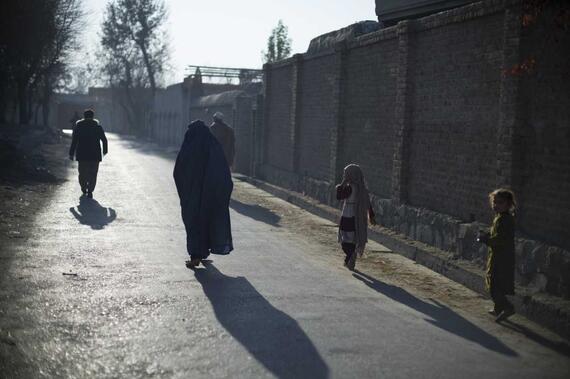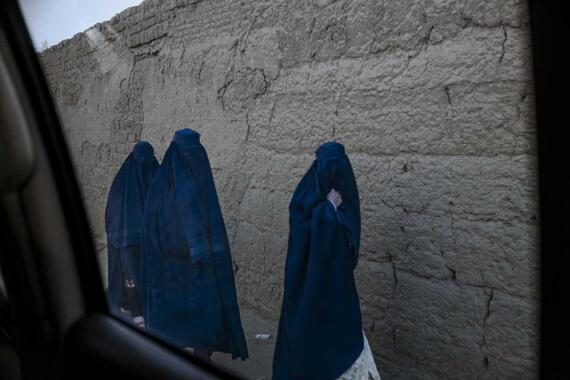Afghanistan “It’s time for women to stand up for other women”

Just two months ago – on 24 December 2022 – the Taliban de facto authorities issued a harsh directive, banning Afghan women from working for national and international non-governmental organizations (NGOs). The international community was united in its response, condemning what was the latest in a series of measures that have dramatically curtailed the rights of women and girls in Afghanistan and increasingly pushed them out of public life.
Afghan women make up between 35 to 40 per cent of the workforce of NGOs – which themselves help implement 80 per cent of humanitarian activities in Afghanistan. These women are an integral part of aid operations in Afghanistan, which is now the world’s largest humanitarian crisis, with 26.1 million people – more than two thirds of the population – receiving life-saving aid each month.
Advocacy with the Taliban continues at all levels to help overturn the ban. Aid agencies remain resolute in their commitment and responsibility to stay and deliver on behalf of the Afghan population in need, and to protect the jobs of Afghan female NGO workers.
Dashed hopes
Khadija,* a young aid worker in Kabul, narrates her experiences and her fears for the future.
She explains: “Growing up as a young girl, especially coming from a minority group, I was determined to work hard and contribute towards the development of my family and community.
“I studied hard, attained excellent marks and was rewarded with a scholarship by the previous Government to study abroad. I was so elated that I was finally realizing my dreams. I started seeing many possibilities as a young Afghan woman, and for my people. I completed my studies and returned home to work in the humanitarian sector, full of hope and enthusiasm to help my country. But with what our country has turned out to be today, all my hopes have been dashed.
“I am heartbroken that instead of being allowed to play a part in developing my country, I am pushed into a corner by a system that is trying to make us women feel like we are not human enough, and as if we are unable to contribute to society. They want us to feel useless.”
We are no longer safe
“Since the Taliban took over in August 2021, we have seen the space, dignity, respect and opportunities for women shrinking and eroding. The ban on female aid workers felt like the final nail in our hopes of seeing a change in the Taliban’s attitude towards women.
“Soon after the Taliban took over, my sister and I were beaten by their security forces in town for allegedly not wearing the hijab properly. From that day, I sensed the worst was coming. Since then, we have witnessed one ban after another. Each ban is taking away our sense of being equal human beings.

“Women in Afghanistan are not and will never be against Islamic culture. But we are no longer safe and have become more vulnerable under the guise of protecting us and upholding Islamic religious values.”
Restrictions affect entire families
“Restrictions on women are making life tough for families. They affect men, women and children, even though women bear the brunt because they are the target.
“When I started working, I asked my father to be my mahram [a male family member]. There was no other man in the family to help me. He escorted me to work every day and accompanied me to carry out family and personal errands.
“This changed when he fell sick. He cannot go around with me anymore, but the de facto authorities still expect us to comply with the mahram requirement. They beat women for not complying with it.
“I was recently turned away by the bank for not having a mahram, and this makes life tough. They do not want us to work, and now we struggle to access our salaries and other essential services.
“I needed money to buy medicine for my father so that if his condition improved, he would be my mahram. Now, I cannot help him to help me. What kind of a life is this?
“I am not the only one. Some of my female aid worker friends are breadwinners, and some are heading families. They face the threat of losing their incomes, which are sustaining their families. If they are lucky to keep their job, they are prevented from accessing services unless they have a mahram.
“Some marriages fall apart once the woman loses her job and stops earning a salary.”
Crying our eyes out
“I feel sad that every time we meet with fellow female aid workers, we spend most of our time crying over the tough conditions we are living under in our own country.

“As young professionals, we are supposed to discuss how to improve our country. We now call these meetings ‘crying sessions.’ They help us to de-stress. It is one way we try to find healing, as it seems the Taliban are not willing to listen to us, their people.
“We do not see a brighter future if we are not allowed to participate in life and society.”
Why ‘marry’ a cousin to have a mahram?
“Some local authorities have approved modalities that allow female aid workers to resume fieldwork, but they are not allowed to work from their offices. Working in the field is also only possible under strict conditions, including adherence to the hijab and mahram requirements.
“I want to feel like any other human being. It is fine that I can do some work and get paid, but it is just not fair that women face unjustifiable pressure to secretly hire and pay a mahram or ‘marry’ cousins for convenience, just to keep a job and to access services. This is not in line with Islamic culture.
“I feel so hopeless that I cannot freely help the people who need assistance, and some of them depend on aid. It is even worse that it is increasingly becoming difficult to help myself because of these restrictions.
“Instead of moving forward we are regressing, and yet our country is the world’s largest humanitarian crisis. How can the country develop if women with exceptional qualifications, skills and experience in key sectors are reduced to street vendors? This is very unfair to women and the nation at large.”
Help us out of this prison
“Afghanistan women are strong and resilient, but at this moment they need the support of everyone across the world. It is time women's rights movements across the world come to the rescue of Afghan women. Please come and help us out of this prison. We are just like your grandmothers, mothers, aunties, sisters and daughters. This is the time for women to stand up for other women.”
*Name has been changed.
